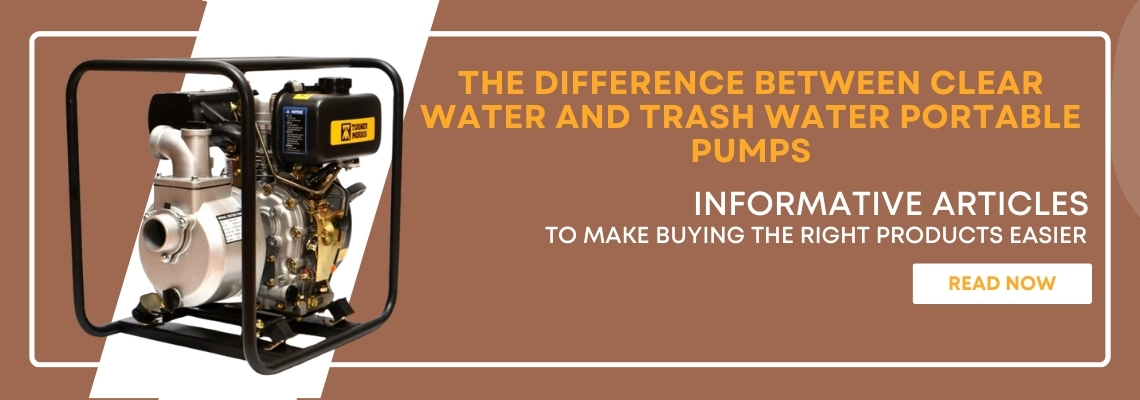Clear water vs trash water portable pumps

Choosing the right water pump – a guide to clear water and
trash water pumps.
When you Google the words, water pump, there are thousands
of listings of water pumps for sale. This can be overwhelming and confusing for
most. AgMarket has done the research and checked what pump works for which
application. Keep reading this article to know how a clear water pump and a
trash water pump are used. Additionally, we also look at a few features to
consider before buying one of these pumps.
1.
Clear water pumps:
A clear water pump is designed to handle
clean or lightly contaminated water with small, minimal debris. You must ensure
that the water you are pumping is relatively free of solids to prevent clogging
and possible damage to the pump engine. It might be worthwhile to ensure the
pump has a filter in front of the intake to ensure that nothing too big goes
into the water pump or clogs it completely.
This pump is ideal for tasks such as
draining a pool or reservoir, dewatering at a construction site or pumping
water from rivers to reservoirs. These pumps can also be handy for other
applications like removing floodwater, refilling water carts and flood
irrigation.
2.
Trash water pumps:
A trash water pump is a heavy-duty unit
designed to handle water containing larger debris, such as leaves, mud, and
small solids. Trash water pumps, also known as sewage pumps are versatile and
find applications in various industries and scenarios, including Construction
sites, wastewater treatment plants, flood control, mining environments,
industrial applications, mud and slurry pumping.
These types of pumps feature clean-out
functions, durable mechanical seals and larger, more heavy-duty impellers to
ensure the pump is not damaged by debris that comes through the system.
Once you have ascertained what kind of water you are moving,
you will need to look at where you are pumping to. If you are pumping water out
of a pit or into a higher area, you will need a pump that can pump to an
elevation or to a certain head height as
it is frequently referred to If your pump is not strong enough, pumping to an
elevation it might lead to slower water flow.
You should also look at the in and outlet sizes of the pump
before purchasing. If you are pumping out a small pool a 25mm inlet and outlet
sizes should be more than adequate, but if you want to pump out a large amount
of water like a dam, your in and outlets should be much larger. Something more
along the lines of a 50 – 100mm inlet and outlet will pump water out much
faster than trying to do the same job with a 25mm outlet.
For this article, we will showcase one of our best models
available – The
Honda Trash/Water pump with GX270 Petrol engine. This beast of a machine is
ideal for commercial use where high-volume trash water capacity is required. At
R29 868 this 8 hp, 4-stroke single-cylinder engine is powerful enough to
provide a total head of 27 m 36 psi (max pressure this pump will pump to) and a
suction head of 8 meters which is the maximum depth that this pump will suck
water from. This pump can displace a massive 78,000 litres/hour, making it fast
and ultra-efficient. This pump comes with a 1 year warranty which is subject to
an annual service. We can also assist you with replacement parts for this
machine.
Another pump to look at is the Turner
Morris Brand clear water pump which is also a 4-stroke diesel engine. The
price is R7822, which makes it much more affordable. The 3.5L Diesel engine can
pump 1000 litres per minute and weighs 45 kg.
The most affordable water pump in this range is the Ryobi Water
pump which comes in at R4748.35. It boasts a carry weight of 29.5kg as well
as an 80 mm in and outlet, can pump to a maximum head height of 30 meters and
lastly, has a maximum output of 600 litres per minute.
Buying the right water pump is easy on the AgMarket online marketplace.
We deliver straight to your door and have an extensive range of pumps for you
to choose from.
Visit our website today.

